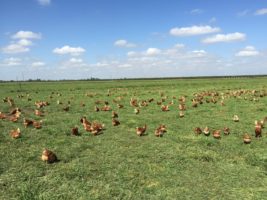Townsend Farms

| Rating |      |
| Farm/Brand Headquarters | Oakdale, CA |
| Market Area | CA |
| Total Score | 1615 |
Townsend Farms (previously Stueve’s Certified Organic) eggs are available at Bay Area & Sacramento Whole Foods stores.
| Criteria | Points | Comment |
|---|---|---|
| TOTAL (possible score is 1700) | 1615 | 5-egg      |
|
Brands that have close daily control over their egg production receive the most points. Ownership Structure | 100 | Single-farm source, daily and hands-on interaction with the laying hens and farm business |
|
Brands that only produce organic products make the biggest investments — in time and money — in systems that benefit us all. Eggs sourced from a single operation receive the most points. Eggs of unclear origins and/or with poor oversight receives the fewest points. Commitment to Organic Label | 100 | 100% organic sourcing and brand |
|
Additional certifications, depending on the credibility of the label, can demonstrate a commitment beyond the organic standards. Other Labels and Standards | 0 | None |
|
Smaller flock sizes (the number of laying hens per housing structure) offer better animal welfare conditions. Flock Size(s) | 100 | Less than 300 birds per coop |
|
The best housing offers space for natural behaviors and legitimate access to the outdoors through adequate exits. Hen Housing and Exit Areas | 100 | Mobile coops with easy access to outdoors and ensures that all hens utilize outdoor space |
|
Adequate indoor spacing reduces stress and disease. With less crowding, birds can stretch their wings and more easily perform other natural behaviors. Indoor Spacing | 100 | Mobile coops give space indoors, 1.6 square feet |
|
High scoring brands provide enough space to allow each hen to fully utilize their outdoor area, and to perform instinctive behaviors without harming the environment. Outdoor Spacing | 100 | Over 200 square feet/hen; mobile coops allow good utilization of outdoor space without crowding |
|
High quality outdoor access includes vegetation, soil, and ample opportunities to forage year-round. Quality of Outdoor Access | 100 | Mobile coops rotated every 2 days, superb quality access that hens can utilize fully |
|
Birds that are introduced to the outdoors early are more accustomed to spending time outdoors without fear or stress. Outdoor Access Timing | 100 | Chicks introduced to outdoors around 4 weeks |
|
Year-round access to perches, scratching areas, deep litter, novel foodstuffs, and dust bathing contribute to quality of life. Enrichments | 100 | Water, feed, and shade are provided outdoors; legitimate outdoor time is provided year-round (weather-allowing) |
|
Chickens use their beaks to interact with the world. Authentic organic farmers account for this behavior, eschewing beak trimming. Alterations | 100 | Beak tipping no longer allowed, but some current flocks still have beak-trimmed birds; no forced molting allowed |
|
Raising chicks on farm or buying them from certified organic hatcheries shows dedication to organic production from start to finish. Chicks and Pullets | 100 | Purchases some certified organic pullets but produces 70% of flock on-farm (closed flock, eggs hatched out by farm) |
|
Brands that have low rates of deaths and utilize their spent hens for human consumption or similar score the highest. Deaths, Culls, and Spent Hens | 100 | Birds live out natural lifespan with low death rate |
|
Brands that closely monitor and manage health of soil, native species, and water quality receive the most points. Environmental Impacts | 100 | Maintains 100% vegetation with close monitoring for impacts |
| Feed Sourcing | 90 | Produces some feed on-farm and obtains feed from organic supplier that distributes locally |
|
Brands that score well here go above and beyond to ensure the highest animal welfare, taking into consideration their hens’ safety and cleanliness, natural behavior, and stress levels. Animal Welfare | 100 | Excellent animal welfare |
|
Cornucopia believes you have a right to transparency. Top brands share information with Cornucopia via a survey and cooperate with our own independent investigations. Transparency | 100 | Full and open transparency |
|
Brands do not receive points, but this information is offered for people with soy and/or gluten allergies. Soy free and/or gluten free? | Not soy or gluten free | |
|
Brands do not receive points, but are invited to submit the name of their Accredited Organic Certifier (suppliers may have different certifiers). Organic Certifier (non-scoring) | Oregon Tilth Certified Organic | |
|
Extra credit is offered for various practices that go above-and-beyond in some form. Extra Credit | 25 | Birds live out natural lifespan |

